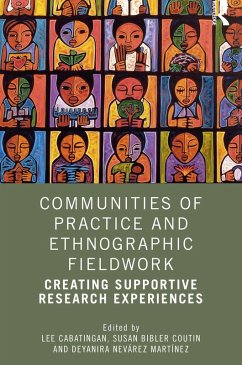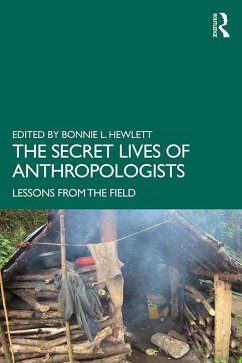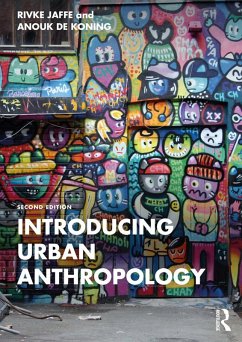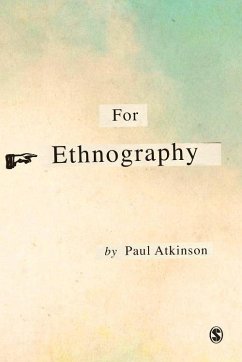
Communities of Practice and Ethnographic Fieldwork (eBook, ePUB)
Creating Supportive Research Experiences
Redaktion: Cabatingan, Lee; Martínez, Deyanira Nevárez; Bibler Coutin, Susan
Versandkostenfrei!
Sofort per Download lieferbar
41,95 €
inkl. MwSt.
Weitere Ausgaben:

PAYBACK Punkte
21 °P sammeln!
Communities of Practice and Ethnographic Fieldwork offers a new perspective on how ethnography might be learned in real time through participation in a supportive community of practice.It draws on the experiences, knowledge, and training of an interdisciplinary group of scholars who have studied legal topics ethnographically alongside and with the support of fellow ethnographers at varying stages of their careers. Contributors address topics that are of interest to those who teach ethnography as well as to those who are learning this approach. Such topics include ethics, positionality in the f...
Communities of Practice and Ethnographic Fieldwork offers a new perspective on how ethnography might be learned in real time through participation in a supportive community of practice.
It draws on the experiences, knowledge, and training of an interdisciplinary group of scholars who have studied legal topics ethnographically alongside and with the support of fellow ethnographers at varying stages of their careers. Contributors address topics that are of interest to those who teach ethnography as well as to those who are learning this approach. Such topics include ethics, positionality in the field, the combination of personal and professional circumstances, and the process and pain of changing research topics. Each chapter emphasizes the role of mentoring and collective problem-solving through a lab model of fieldwork practice, particularly when carrying out research with subjects and interlocutors who may have undergone trauma.
Written by a diverse group of scholars, this volume will appeal especially to Black, Indigenous, and People of Color, and female-identifying ethnographers in a range of fields. It provides a framework for how fieldwork can continue moving forward even in the most challenging of times and will be of particular interest to scholars in anthropology, sociology, law, urban planning/studies, geography, political science, ethnic studies, public policy, sociolegal studies, and education.
It draws on the experiences, knowledge, and training of an interdisciplinary group of scholars who have studied legal topics ethnographically alongside and with the support of fellow ethnographers at varying stages of their careers. Contributors address topics that are of interest to those who teach ethnography as well as to those who are learning this approach. Such topics include ethics, positionality in the field, the combination of personal and professional circumstances, and the process and pain of changing research topics. Each chapter emphasizes the role of mentoring and collective problem-solving through a lab model of fieldwork practice, particularly when carrying out research with subjects and interlocutors who may have undergone trauma.
Written by a diverse group of scholars, this volume will appeal especially to Black, Indigenous, and People of Color, and female-identifying ethnographers in a range of fields. It provides a framework for how fieldwork can continue moving forward even in the most challenging of times and will be of particular interest to scholars in anthropology, sociology, law, urban planning/studies, geography, political science, ethnic studies, public policy, sociolegal studies, and education.
Dieser Download kann aus rechtlichen Gründen nur mit Rechnungsadresse in A, B, BG, CY, CZ, D, DK, EW, E, FIN, F, GR, HR, H, IRL, I, LT, L, LR, M, NL, PL, P, R, S, SLO, SK ausgeliefert werden.













